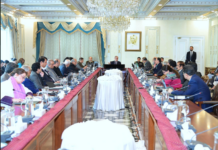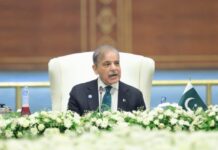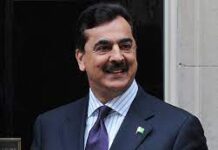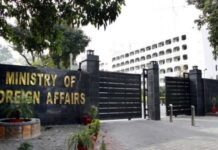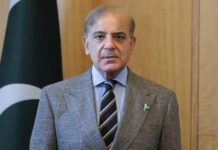Chinese intense “shuttle diplomacy” has helped Islamabad and Kabul to revive high-level contacts and agree on certain confidence-building measures at a time when Afghanistan had put a pause on high-level contacts with Pakistan.
Chinese Foreign Minister Wani Yi, speaking in Islamabad on June 25 after he concluded talks with the Afghan and Pakistani leaders, confirmed he has “conducted shuttle diplomacy between Afghanistan and Pakistan on the instruction of his leaders” as both countries had expressed interest in China’s such a role.
The joint statement issued at the conclusion of Wang’s June 24-25 mentioned the important agreement between Afghanistan and Pakistan under which they will establish a crisis management mechanism, which will include prevention through timely and effective intelligence and information sharing and to seek proper solution through dialogue and consultation.
This was indispensable to end the tradition of blame game both countries, mostly Afghan side, choose after almost major attack in Kabul or other part of the war-ravaged country. The devastating truck bomb attack in Kabul’s diplomatic neighbourhood on May 31 is the recent example when the Afghan intelligence agency NDS publicly claimed the blast was “planned by Haqqani network in Pakistan with the direct help of Pakistan’s intelligence agency (ISI),” Tolo News quoted an NDS statement as saying.
Pakistan and Afghanistan face serious security challenges, mistrust has hindered cooperation in security areas but both countries are now bound under this mechanism to seek a “proper solution through dialogue and consultation and preventing deterioration of the situation which might have negative effect on the bilateral relationship.” China, which has played the role of facilitator, supports this mechanism and will probably take a look at progress.
Another key outcome of Chinese FM was the agreement to establish the China-Afghanistan-Pakistan Foreign Ministers’ dialogue mechanism to cooperate on issues of mutual interest, beginning with economic cooperation. This understanding could address to Kabul’s repeated calls for a third party verification of claims by Pakistani and Afghan officials regarding the activities of the militants. Bilateral track is the most effective and viable to resolve differences but in view of the complex nature of the relationship, Pakistan and Afghanistan have agreed to China’s role because it is a reliable friend of both countries.
Although Beijing role to facilitate Pak-Afghan dialogue has raised some hopes, it will be unfair approach to believe that the two uneasy neighbours will bridge their trust gap in days when a vast majority in Pakistan strongly believes that war in Afghanistan is responsible for terrorism in their country and Afghans think Taliban leaders use Pakistani soil to continue war in their country.
A key factor of China’s current proactive regional diplomacy is to promote peace and reconciliation in Afghanistan, which would also help protect China’s troubled Xinjiang province, which has a large Muslim population of mainly Turkic-speaking Uygurs. Xinjing, which has borders both Pakistan and Afghanistan and with six other countries, has witnessed a surge of violence in recent years that has killed hundreds of people. In his meeting with President Ghani, the Chinese FM sought Kabul’s help in taking action against the East Turkistan Islamic Movement (ETIM) as he called it as a serious threat for China.
China is among the few countries, which has contacts with the Qatar-based Taliban political representatives. A delegation of the Taliban political envoys travelled to China earlier this year at the invitation of the Chinese government to encourage the insurgents to join the peace process. Taliban officials, who had confirmed the visit to the writer, hinted to accept the role of China as one of the guarantors in case they decide to join peace talks. As China has not military involved in Afghanistan, Taliban leaders believe that unlike others, Beijing carries no extra-baggage. The conclusion is China enjoys the confidence of the Afghan Government and the Afghan Taliban as well as Pakistan.
In February this year, Chinese special envoy for Afghanistan, Deng Xijun, told President Ghani in Kabul that his country has “encouraged the Taliban during our contacts with them to join the peace process.”
The understanding to revive Quadrilateral Coordination Group of Afghanistan, China, Pakistan and the US to “create an enabling environment for peace talks and for Taliban to join the peace talks” is crucial as it is an effective grouping to work for the reconciliation. The US drone strike, which had killed the Taliban chief Mullah Akhtar Mansour on May 21, 2016, had halted the QCG.
Besides the QCG, now the Russians are leading another key regional peace initiative and Mr Ghani has launched the Kabul Process to find out a political solution to the problem, the Trump administration’s eagerly-awaited review should not detract all these vital diplomatic efforts. Although no decision has yet been taken, reports suggest the US is likely to send additional 4000 troops to Afghanistan to raise the number of American troops to nearly 12,400.
Instead of troops surge, the US should shift focus to negotiated settlement as the US Defence Secretary James Mattis admitted in early June, “We’re not winning in Afghanistan right now.” So if the US could not win militarily with around American 100,000 troops, how would they defeat Taliban with 12,400 troops?
The writer is an Islamabad-based journalist who regularly writes on Afghanistan
Published in Daily Times, July 2nd , 2017.





